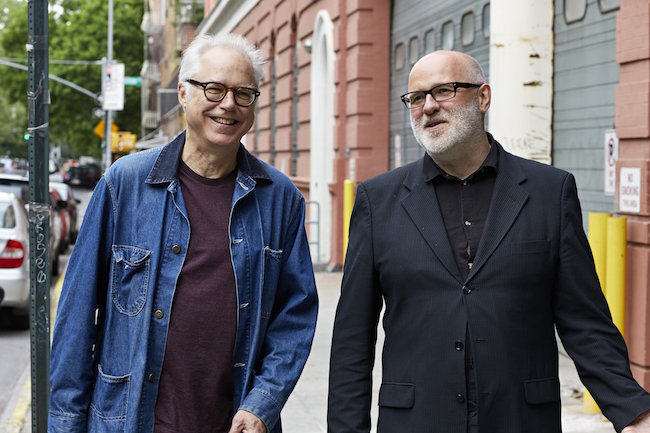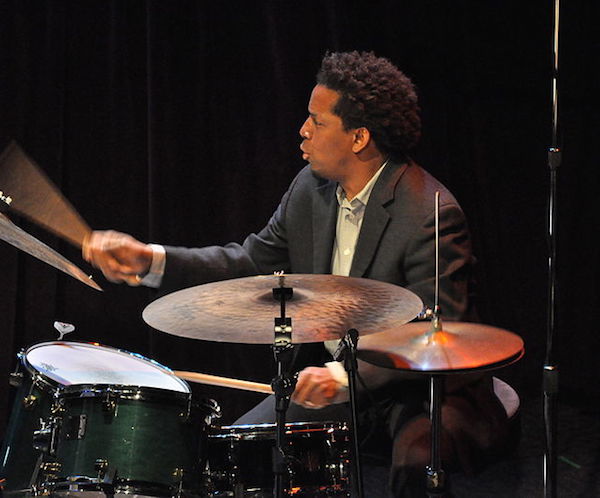Jazz LP Review: Newvelle Records — Sounds Sweet and Clear
Newvelle Records’ taste seems to be flawless.
Skúli Sverrisson and Bill Frisell, Strata (Newvelle Records)
Francisco Mela, Ancestros (Newvelle Records)

Skúli Sverrisson and Bill Frisell. Photo: Jordan Kleinman.
By Michael Ullman
Newvelle Records is a Paris-based company that produces beautifully packaged, carefully produced, high-end vinyl lps that mostly feature lyrical jazz players: I have their second season which includes sessions led by Jack DeJohnette, Ben Allison, Don Friedman, and others. More recently they have issued lps by Lionel Loueke (Arts Fuse review), as well as Steve Cardenas’s tribute to Charlie Haden and Andrew Zimmerman’s date with trumpeter Dave Douglas. The company’s taste seems to be flawless. Currently, I am listening to music written by Icelandic bassist Skúli Sverrisson for Bill Frisell, and performed as a series of duets, and Cuban drummer Francisco Mela’s quartet, whose lineup includes saxophonist Hery Paz, pianist Kris Davis, and bassist Gerald Cannon.
The pleasure begins even before the music hits. Take a Newvelle lp from its heavy packaging, with its beautifully reproduced photos of the natural world on its covers, and you immediately notice the heft of the record. Both Sverrisson’s and Mela’s are transparent. It may be an odd thing to notice, but these discs are perfectly flat: they made me see how many of my lps are subtly warped. When the needle on my high end turntable hits the record, I hear … nothing. This is just as it should be. The recorded sound is close and sweet and clear: Newvelle artists never say a mumbling word.
Strata’s ten numbers are composed by its leader, bassist Sverrisson, and he rarely raises his voice. His music is as quiet and engrossing as the rustling of leaves. On “Afternoon Variant,” Sverisson strums a repeated, skipping bass line, delineating the tune’s few chord changes; Frisell plays the melody, strumming peacefully, offering neatly plucked variations. The bassist rarely asserts himself, but these are true duets: Frisell has rarely sounded less American folksy. He listens carefully to his partner, whose sound on electric bass almost matches that of the guitarist. On the gently assertive “Sweet Earth,” Frisell plays the wave-like melody in concert or alternately with Sverrisson: the song swells and recedes repeatedly. The two voices meld, serving the gracefully shifting flow of Sverisson’s compositions. The result is splendid, a kind of nonchalant poeticism.

Drummer Francisco Mela. Photo: Joe Mabel.
I’ve heard drummer Francisco Mela with Kenny Barron and McCoy Tyner, two very different pianists. He’s also performed with John Scofield, Joanne Brackeen, and others. He’s the composer of seven of the pieces recorded on Ancestros, including the title cut, which opens with oboist Hery Paz playing a high-pitched, exotic melody over intermittent comments from the composer and then remarks by the estimable pianist Kris Davis. Paz returns on bass clarinet: he proves to be a versatile player, nimbly performing the slightly anxious melody and then improvising on his awkward instrument.
Mela should be commended for his taste in his song selection: they include the late pianist Andrew Hill’s “Not So” from Smokestack and drummer Paul Motian’s “Mumbo Jumbo” from The Sound of Love. (The latter tune has also been covered by The Bad Plus with Bill Frisell.) Mela’s a sensitive drummer, even in his solos. He begins his “It’s Good to Be Free” quietly, all by himself — when he hits a gong, it comes off as a major event. Then Davis enters with Paz in a surprisingly agitated way — the piece then once more becomes subdued. It’s fitting that it is pianist Davis who is given the opportunity to limn Hill’s melody, “Not So,” which the band plays with appropriately playful zest. Again, the drummer solos with the utmost delicacy. The band also, with “Ornette,” performs Mela’s tribute to a fallen giant. The drummer excels in what could be called temperate avant-gardism, music made by a musician who has spent his life listening carefully, and I would guess brilliantly, to others.
Michael Ullman studied classical clarinet and was educated at Harvard, the University of Chicago, and the U. of Michigan, from which he received a PhD in English. The author or co-author of two books on jazz, he has written on jazz and classical music for The Atlantic Monthly, The New Republic, High Fidelity, Stereophile, The Boston Phoenix, The Boston Globe, and other venues. His articles on Dickens, Joyce, Kipling, and others have appeared in academic journals. For over 20 years, he has written a bi-monthly jazz column for Fanfare Magazine, for which he also reviews classical music. At Tufts University, he teaches mostly modernist writers in the English Department and jazz and blues history in the Music Department. (He plays piano badly.)
